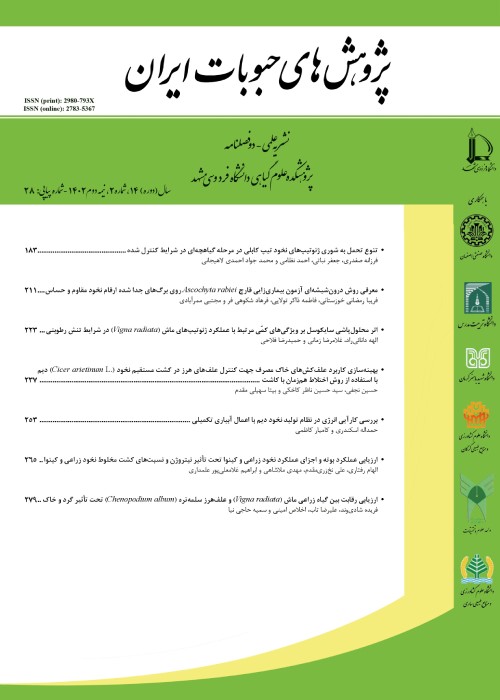Biological control of chickpea Fusarium wilt and root rot caused by Fusarium oxysporum and Fusarium solani with plant probiotic bacteria
Wilt and root rot diseases caused by Fusarium oxysporum and Fusarium solani are among the most important diseases of chickpea throughout the world and Iran. However, there is not effective chemical fungicide against these soil-borne pathogenic fungi. In recent years, rhizospheric bacteria and fungi developed as promising biofungicides against soil-borne plant pathogens. These microbes exploit several mechanisms such as antibiotics, volatile organic compounds, sidereophore and induced systemic resistance to suppress pathogenic fungi. Recently, the cost of agrochemical innovation and the period of time for their registration have increased rapidly due to stringent legislation, both of these reasons favor investment in the manufacture of biopesticides. The annual progress rate of the biopesticide bazaar is more than 16%, but that of synthetic pesticides has been decreasing by 1.5% annually. Biopesticide companies such as Agroquest, Gustafson, Marrone Bio Innovation, Certis, BioWorks, Becker Underwood, ABiTEP GmbH, and Prophyta have released effective biopesticides to the market. Agrochemical great-companies such as Bayer CropScience have also been engrossed in the bio-pesticide market. Bayer CropScience bought Agroquest in 2012 at a price of 425 million US dollars. Overall, biological control of plant pathogens is promising technology in management of plant disease in sustainable agriculture.
In this study, potential of plant growth promoting rhizobacteria (PGPRs) were investigated on biological control of this diseases in laboratory and greenhouse condition. Soil samples were collected from chickpea fields in Kermanshah and Kurdestan provinces. The effect of isolated bacteria were assessed on mycelial growth of F. oxysporum and F. solani in dual culture test. The chickpea seeds were inoculated by 109 CFU/ml of each bacterial isolates and sown in pots. The effect of bacterial isolates have been investigated on plant growth factors in greenhouse situation. The same experiment was conducted to assess the biocontrol ability of selected isolates against Fusarium wilt and root rot disease of chickpea. The greenhouse experiments were conducted based on completely randomized design with four replicates. Data were subjected to analysis of variance procedure in SAS ver. 9.1 software and means compression analysis was done by Fisher protected LSD. Finally, the 16S rDNA of the four selected isolates, B2, B3, B6 and B13 were sequenced and identified based on Genebank data.
Sixteen out of 100 isolated inhibited the growth of both fungi in vitro. Isolates B13 with 11 mm inhibition zone had the highest growth inhibition activity against F. oxysporum. In absence of pathogens, B2 increased aerial part dry weight from 1.08 to 3.69 g in greenhouse condition. B3 and B4 were the best isolates in improving root growth. They increase root dry weight to 1.42 and 1.36 g, respectively. B2 and B13 isolates had the greatest effect on plant health and reduced disease severity up to 90% in F. oxysporum inoculated plants. The lowest biocontrol activity against F. oxysporum was recorded for isolate B6. B2 increased aerial part fresh weight from 0.56 to 2.49 g, root fresh weight from 0.24 to 1.31 g. B6 was the best isolate for suppression of F. solani and reduced the disease index by 73%. This isolate increased aerial organs fresh weight as up to 3.2 folds and root fresh weight up to 2.9 folds. However, all of bacteria isolates were able to reduce Fusarium root rot disease, significantly. Isolates B2, B3, B6 and B13 were characterized as Bacillus sp., Achromobacter sp., Bacillus pumilus and Burkholderia sp. based on 16S rDNA sequencing, respectively. Bacillus spp. strains exploit several mechanisms such as antibiosis, volatile organic compound production and induced systemic resistance against plant pathogens. These bacteria are good candidate to be formulated in spore suspension form. Here, Achromobacter introduced as good candidate for biological control of Fusarium diseases of chickpea for first time. Overall, plant probiotic bacteria could be consider as promising approach in management of chickpea Fusarium diseases.
Bacterial isolates have different ability in plant growth improvement and suppression of plant pathogens. Bacillus sp. was the best isolate for enhancing the shoot dry weight while Achromobacter sp. was the best to improving root dry weight. Indeed, bacteria have several mechanisms for promoting plant growth. Auxin induction by volatiles of Bacillus spp. increase root while decreasing the shoot accumulation of auxin. Overall, consortia of bacteria strains seems to be promising approach to suppression of both diseases in chickpea.
- حق عضویت دریافتی صرف حمایت از نشریات عضو و نگهداری، تکمیل و توسعه مگیران میشود.
- پرداخت حق اشتراک و دانلود مقالات اجازه بازنشر آن در سایر رسانههای چاپی و دیجیتال را به کاربر نمیدهد.


